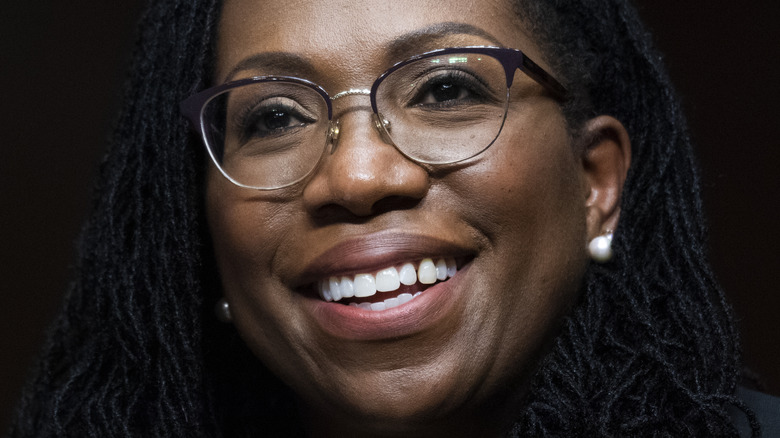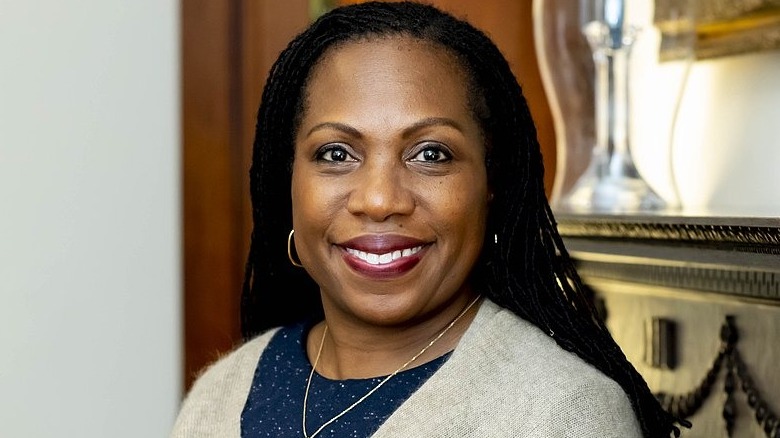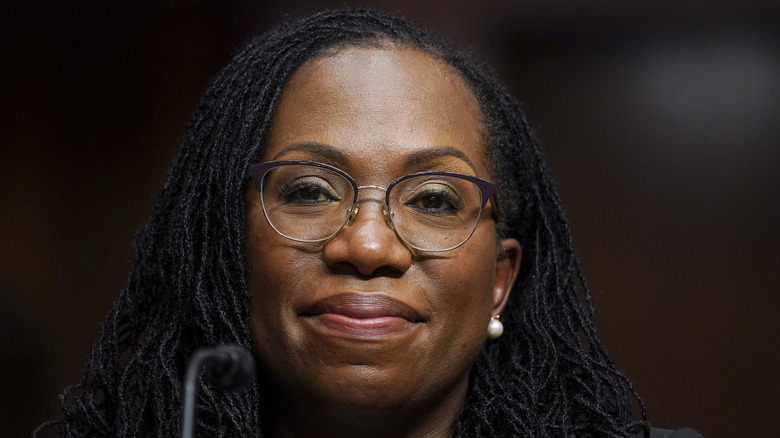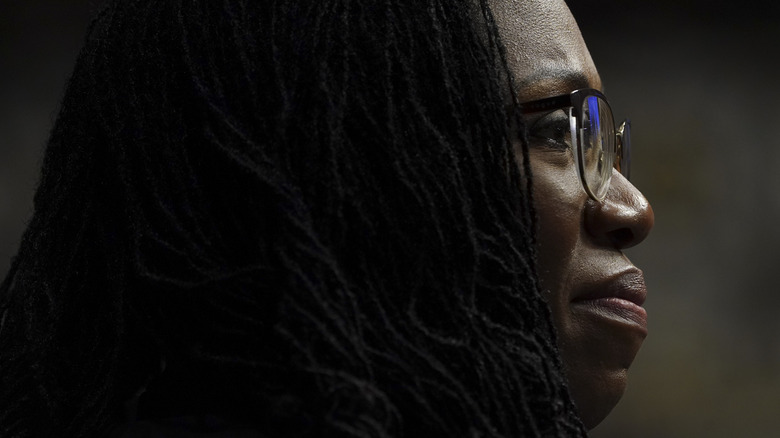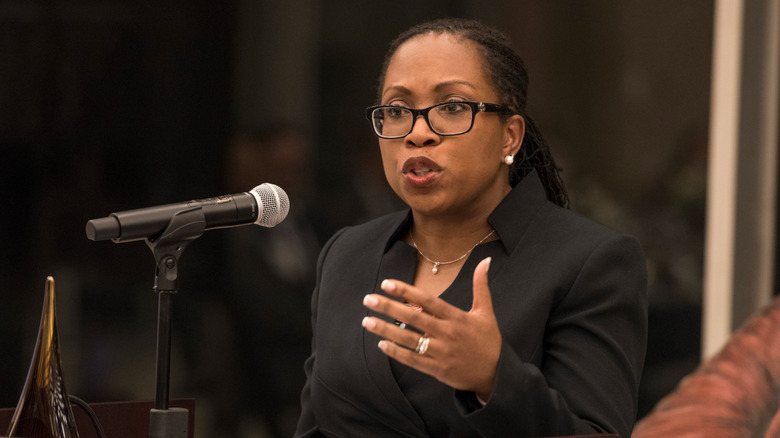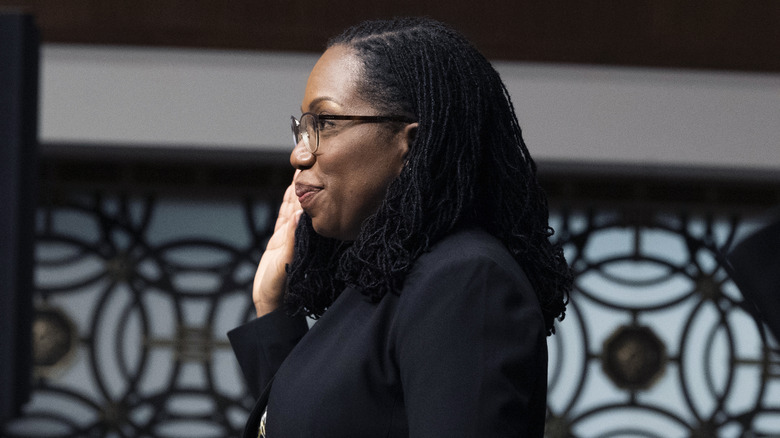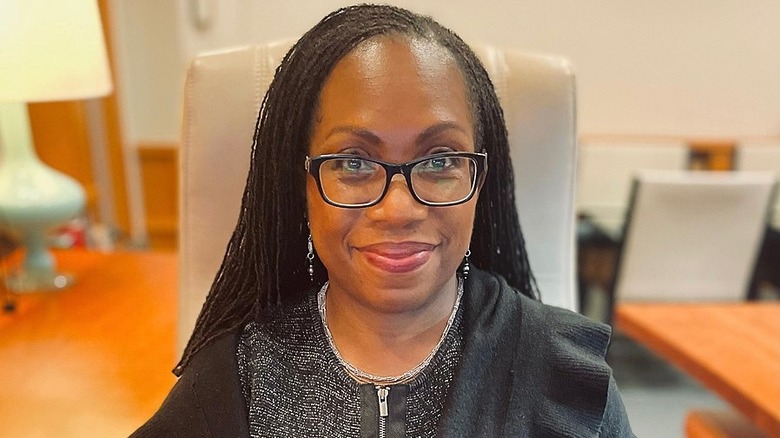The Untold Truth Of Ketanji Brown Jackson
Following Supreme Court Justice Stephen G. Breyer's retirement announcement, President Joe Biden had a choice to nominate the next person to sit in the highest seat in the nation's judicial system. Roughly one month after Breyer said he wanted to step down, Joe Biden made a historical announcement and he nominated Ketanji Brown Jackson to take Breyer's place. This also meant Jackson would be the first Black woman ever on the Supreme Court. At 51, Jackson was set to be the second youngest justice on the Supreme Court, just one year older than the woman who joined before her, Justice Amy Coney Barrett, per The Washington Post.
Prior to the selection, Jackson was serving on the U.S. Court of Appeals for the D.C. Circuit since 2021. Prior to that, she was a judge in the U.S. District Court for the District of Columbia since 2013, according to her White House bio.
Throughout her career in law, Jackson showed a determination of fighting for justice. Not that it was always easy, as her unique background also meant she had a few unlikely connections in the world of politics. Jackson showed she is ready for any legal problem and set herself up to make landmark decisions for the rest of her career on the Supreme Court of the United States. Grab your gavel for the untold truth of Ketanji Brown Jackson.
Ketanji Brown Jackson thoughts on work-life balance
After an impressive run through higher education, Jackson decided to become a public servant and work in the federal court system. "I remember thinking very clearly that I felt like I didn't have enough of an idea of what really happened in criminal cases, I wanted to understand the system," Jackson said in a 2021 hearing about forgoing a path in private law, per CNN. "I thought it would be an opportunity to help people as well, I come from a background of public service. My parents were in public service my brother was a police officer and in the military and being in the public defenders office felt very much like the opportunity to help with my skills and talents," she said.
Another reason came down to growing a family. She and her surgeon husband Patrick Jackson have two daughters together named Talia and Leila. "Like so many women who enter Big Law, I soon found it extremely challenging," she said at a 2017 University of Georgia event, per Bloomberg Law. The Supreme Court nominee added, "You start to feel as though the demands of the billable hour are constantly in conflict with the needs of your children and your family responsibilities." Jackson was also up against steep odds. She once noted that lawyers of color only made up "8% of law firm equity partners nationwide," according to CNN.
Ketanji Brown Jackson helped her family
Ketanji Brown Jackson received a letter in 2005 from her uncle Thomas Brown Jr., asking for help. Brown was her dad's older brother and sadly, due to a "three strike law," he was serving a life sentence in federal prison for drug related offenses, per The Washington Post. At the time, Jackson worked as a federal public defender. She referred his case to a law firm that agreed to work free of charge for Brown. According to one of Jackson's friends, she "already knew what has become a national consensus that the nation's drug laws were overly harsh."
Due to the non-violent nature of Brown's crimes, President Barack Obama commuted Brown's sentence in 2016. Details about the connection to Jackson were later clarified by WilmerHale, the law firm that represented Brown. According to a statement, Jackson only forwarded her uncle's case to the firm and then had "no further involvement in the matter," via CNN.
Though Jackson never publicly discussed the matter, she did take a moment during her 2021 confirmation hearing to get into why she became a public defendant in the first place. "I speak to them directly," she said about the defendants she represented, per CNN. "I want them to know what is going on." One of Jackson's former colleagues said that he felt her experience as a public defender was unique among the other Supreme Court members because she has "an idea how the system actually works."
Ketanji Brown Jackson's strange political connection
Though she represents the Democratic party as a liberal member of the United States Supreme Court, Ketanji Brown Jackson is actually connected to the Republican party. This became abundantly clear when she was in line to become a federal district judge in the District of Columbia. Presidential candidate Barack Obama nominated her to the position in 2012 when he was running for reelection against Mitt Romney and Paul Ryan, the former Speaker of the U.S. House of Representatives. However, if Obama lost, Romney and Ryan would have been the President and Vice President. As for Ketanji Brown Jackson, she would then face the possibility of not being appointed as a federal judge. The loss would have stung even more because she is related to one of the opponents: the twin brother of her husband, Patrick Jackson, is Ryan's brother-in-law William Jackson. According to Bloomberg Law, Ketanji remembered in a 2017 speech, "I was unusually jumpy and started so many scarves that I could've outfitted a small army."
She didn't have to worry and Ketanji ultimately filled the position in 2013. Even better, Ryan supported Ketanji during her nomination hearing. "Our politics may differ, but my praise for Ketanji's intellect, for her character, for her integrity is unequivocal," Ryan said, per ABC News. He noted that they are "family, by marriage," and added, "She's an amazing person, and I favorably recommend her consideration." According to Ryan, his brother-in-law and sister Dana were in the audience for Ketanji's hearing.
Inside Ketanji Brown Jackson's childhood
Ketanji Brown Jackson was born in the nation's capital — fitting, given her future selection to the Supreme Court of the United States. As a child, Jackson grew up in Miami, Florida, with two parents in the education sector. Per CNN, her mother was a teacher who became a principal, and her father was a teacher who eventually became the "chief counsel to the Miami-Dade County school board." Following in the footsteps of her academic parents, Jackson was a member of her school's debate team and, according to her White House bio, was a student body leader at the junior and high school levels. Though her guidance counselor suggested she not set her "sights so high," she applied to Harvard University — and she got in.
Clearly a standout student, she then attended Harvard Law School. Filled with an impressive resume as a federal judge and public defender, the Harvard Board of Overseers appointed Jackson to be a member in 2016. The nomination to the Supreme Court puts Jackson in a tricky position — and potentially a conflict of interest — since the court was scheduled to hear cases involving affirmative action at Harvard, per The Harvard Crimson.
What Ketanji Brown Jackson thinks about making history
After Joe Biden announced his pledge to put the first Black woman to be in the United States Supreme Court, he received praise from many... as well as backlash from the Republican party and conservatives. Per The Washington Post, Fox News personality Tucker Carlson said of Biden's decision, "It's possible we have all marinated for so long in the casual racism of affirmative action that it seems normal now to reduce human beings to their race." Nikki Haley, Donald Trump's first female cabinet member as U.S. Ambassador to the United Nations, tweeted, "Would be nice if Pres Biden chose a Supreme Court nominee who was best qualified without a race/gender litmus test."
Jackson had been through a similar discussion during her confirmation hearings for her position on the U.S. Court of Appeals for the D.C. Circuit. She was asked how and if race would play a factor in her appointment as a judge. "I've experienced life in perhaps a different way than some of my colleagues because of who I am, and that might be valuable," Jackson responded, via CNN. "I hope it would be valuable if I was confirmed to the circuit court."
Supreme Court member Stephen G. Breyer believed in her abilities even before nomination. Breyer advised the judiciary committee at Jackson's 2012 confirmation hearing to immediately hire Jackson. "She is great, she is brilliant. She is a mix of common sense, thoughtfulness," Breyer reportedly said.
Ketanji Brown Jackson's connection to her predecessor
It's a fairly common occurrence for a nominee to the Supreme Court of the United States to have worked for another justice already in the court. For example, Chief Justice John Roberts worked as a law clerk under William H. Rehnquist, who later became the Supreme Court Chief Justice. Both of Donald Trump's selections to the court, Brett Kavanaugh and Neil Gorsuch, had similar experiences. Gorsuch worked for two former members of the Supreme Court, Justice Byron White and Justice Anthony M. Kennedy. Ruth Bader Ginsburg replaced White in 1993 when he retired. As for Kavanaugh, he also worked as a law clerk for Justice Anthony M. Kennedy, who he ended up replacing in 2018. Ketanji Brown Jackson was set to follow this tradition when she was announced as a nominee to the Supreme Court. In 1999, Jackson was a law clerk for Justice Stephen G. Breyer, who became her mentor, according to her White House bio. Similar to Breyer, Jackson spent part of her early career with the U.S. Sentencing Commission.
Looking back, Jackson said Breyer was an integral part to her formation as a lawyer. She was grateful "to bear witness to the workings of his brilliant legal mind," Jackson said in 2017, per CNN. At the same event, Jackson also revealed that Breyer was an avid biker, so much that would show up to court in "full bicycle regalia" after riding to work.

